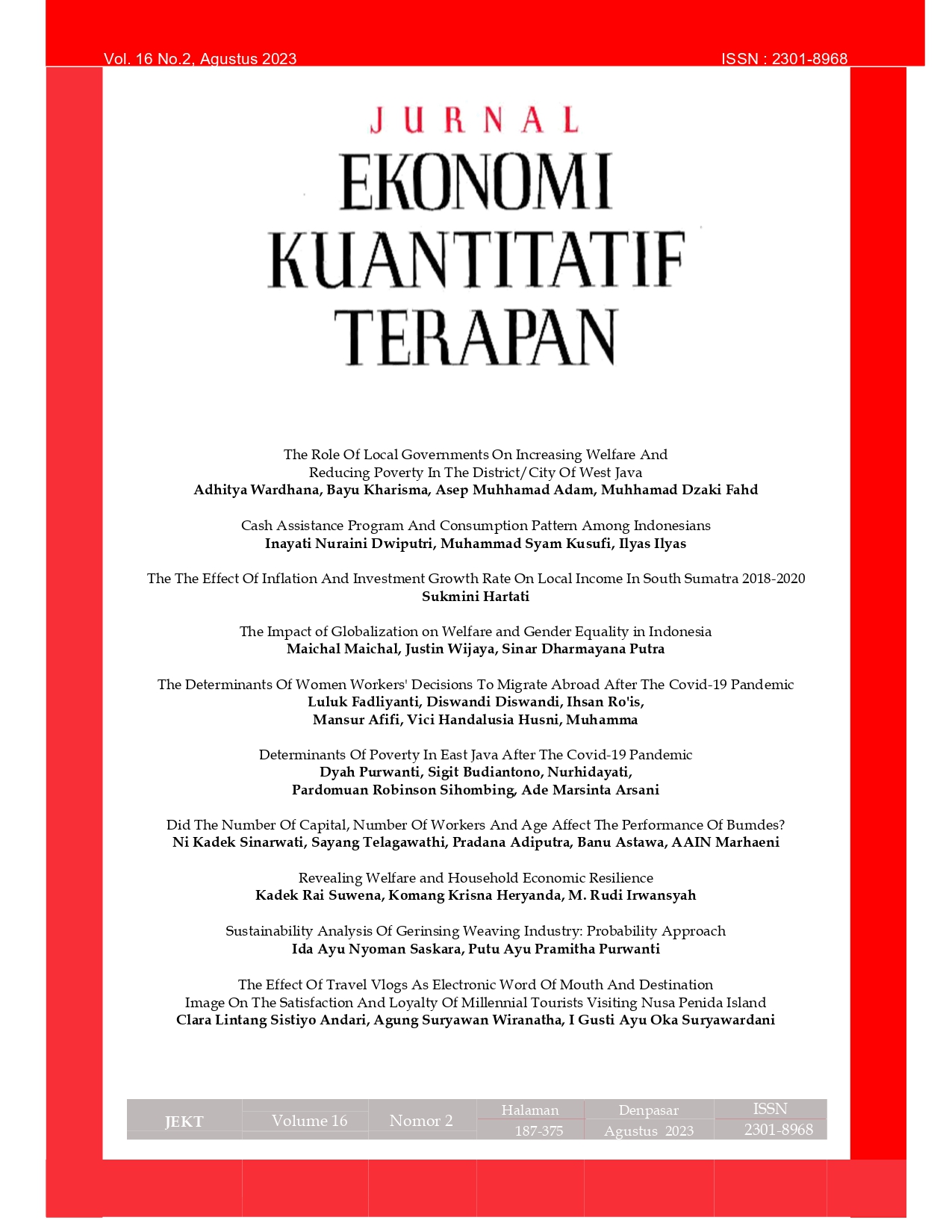Cash Assistance Program and Consumption Pattern Among Indonesians
Abstract
Poverty and households’ economic fragility have been a concern among Indonesian, and the government has addressed this issue by granting a cash assistance program. There will be some effects related to the program. Therefore, this study identifies the effect of cash assistance program on consumption changes among Indonesian as the measurement for public welfare. This paper can be a reference to determine the nexus between transfers and attempting to improve public welfare. This study used Indonesian Family Life Survey (IFLS) as longitudinal datal, and controlled the respondent’s characteristics and adopted the fixed effect at the village level as an estimation technique. The results reveal that, generally, there was a decline in food expenditure that is followed by changing consumption behavior among Indonesian, and the cash assistance program has contributed remarkably to this change. The finding also notes that the objectives of the cash assistance program have not been appropriately achieved as predicted.
JEL Classification: H24, I38, O21
Downloads
References
Aung, T., Bailis, R., Chilongo, T., Ghilardi, A., Jumbe, C., & Jagger, P. (2021). “Energy Access and the Ultra-poor: Do Unconditional Social Cash Transfers Close the Energy Access Gap in Malawi? Energy for Sustainable Development, 60, 102–112.
Cameron, L., & Shah, M. (2012). “Can Mistargeting Destroy Social Capital and Stimulate Crime?: Evidence from Cash Transfer Program in Indonesia”. Victoria: Monash University.
Cox, D., Hansen, B. E., & Jimenez, E. (2004). “How Responsive Are Private Transfers to Income? Evidence from a Laissez Faire Economy”. Journal of Public Economics, 2193-2219.
Das, J., Toan Do, Q., Ozler, B. (2005). “Reassessing Conditional Cash Transfer Programs”. The World Bank Research Observer 20(1): 57-80.
Dwiputri, I.N., Prastiwi, L.F., & Agustin, G. (2022a). “The Effect of Banks and Cooperatives in Improving Welfare”. Jurnal Ekonomi Kuantitatif Terapan 15(1): 59-71.
Dwiputri, I.N., Prastiwi, L.F., Agustin, G. & Ibrahim, D. (2022b). “The Effect of Cooperative Credit to the Welfare”. UTMS Journal of Economics 13(2): 276-284.
Dwiputri, I.N. (2017). ”The Impact of the Unconditional Cash Transfer Program (BLT) on Cigarette Consumption in Indonesia Society”. Journal of Indonesian Economy and Business. 32(2): 138-150.
Frankenberg, E., & Thomas, D. (2001). “Women's Health and Pregnancy Outcomes: Do Services Make a Difference?” Demography 38(2): 253-265.
Golan, J., Sicular, T., & Umapathi, N. (2017). “Unconditional Cash Transfers in China: Who Benefits from the Rural Minimum Living Standard Guarantee (Dibao) Program?” World Development, 93, 316–336.
Habimana, D., Haughton, J., Nkurunziza, J., & Haughton, D. M. A. (2021). “Measuring the Impact of Unconditional Cash Transfers on Consumption and Poverty in Rwanda”. World Development Perspectives, 23.
Hossain, N., Brook, S., Garbarino, S., Notosusanto, S., Noor, I.R., and Seda, F. (2012). “Qualitative Assessment: The Social Impacts of Cash Transfer Programmes in Indonesia”. Tim Nasional Percepatan Penanggulangan Kemiskinan (TNP2K).
Hossain, S. J., Roy, B. R., Sujon, H. M., Tran, T., Fisher, J., Tofail, F., Arifeen, S. E., & Hamadani, J. D. (2022). “Effects of integrated psychosocial stimulation (PS) and Unconditional Cash Transfer (UCT) on Children's development in rural Bangladesh: A cluster randomized controlled trial”. Social Science & Medicine, 293.
Khandker, S. R., Koolwal, G. B., and Samad, H. A. (2010). Handbook on Impact Evaluation, Quantitative Methods and Practices. Washington DC: The World Bank.
Martinez, D.M & Maia, A.G. (2018). “The Impacts of Cash Transfers on Subjective Wellbeing and Poverty: The Case of Colombia”. Journal of Family and Economic Issues 29: 616-633.
Mishra, A.K & Kar, A. (2017). “Are Targeted Unconditional Cash Transfers Effective? Evidence from a Poor Region in India”. Soc Indic Res 130: 819-843.
Park, C. (2003). “Interhousehold Transfers between Relatives in Indonesia: Determinants and Motives”. Economic Development and Cultural Change, Vol. 51, No. 4, 929-945.
Rasyid, M. (2013). “Crowding-out Effect of Cash Transfer Programs on Inter-household Transfers: Evidence from Indonesian Family”. Journal of Economics and Sustainable Development 4(2): 47-53.
Rawlings L.B., and Rubio, G.M. (2005). “Evaluating the Impact of Conditional Cash Transfer Programs”. The World Bank Research Observer 20(1): 29-55.
Renzaho, A.M.N., Chen, W., Rijal, S., Dahal, P., Chikazaza, I.R. (2019). “The Impact of Unconditional Child Cash Grant on Child Malnutrition and Its Immediate and Underlying Cause in Five District of the Karnali Zone, Nepal – A Trend Analysis”. Archives of Public Health 77: 24.
Ressler P. (2008). “The Social Impact of Cash Transfers”. Regional Network on AIDS, Livelihoods and Food Security International Food Policy Research Institute.
Ribas, R.P. (2020). “Liquidity Constraint, Spillovers, and Entrepreneurship: evidence from a cash transfer program”. Small Bus Econ 55: 1131-1158.
Sharma, A., & Lal, D. (2009). “Private Household Transfers and Poverty Alleviation in Rural India: 1998-1999”. The Journal of Applied Economic Research , 3 (2), 97-112.
Soares, Fabio V; Ribas, R and Osorio, R. (2010). “Evaluating the Impact of Brazil’s Bolsa Familia: Cash Transfer Programs in Comparative Perspective”, Latin American Research Review 45(2): 173-190.
Witoelar, F., Strauss, J. and Sikoki, B. (2009). “Socioeconomic Success and Health in Later Life: evidence from the Indonesia family life survey”. RAND Labor and Population Working Paper Series.
Yamauchi, Chikako (2005). “Evaluating Poverty Alleviation through Microcredit: Methodological and Empirical Evidence from Indonesia”, Job Market Paper, Department of Economics University of California.




















